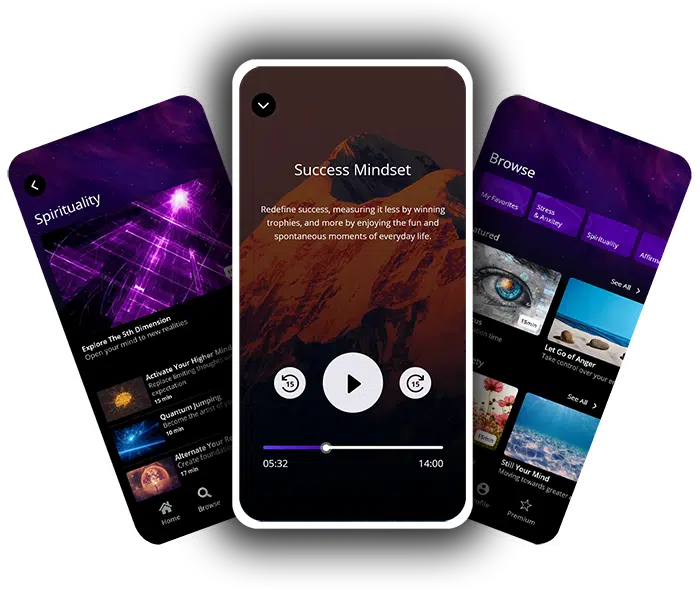Feeling overwhelmed by the emotions of others? You’re not alone. Many people are highly attuned to the feelings around them, a key trait of being an empath. This article will guide you through understanding whether you fit this unique personality type.
Ready to find out?

Unleash Your True Potential!
Explore the world of meditation with our powerful guided sessions crafted to bring peace and strength to your spirit.
But first, let’s ensure our sessions are the perfect fit for you.
Take our short quiz to find out!
Table of contents
Key Takeaways
- Being an empath means you’re deeply in tune with others’ emotions, feeling their joys and pains almost as if they were your own.
- Signs that you might be an empath include feeling overwhelmed in crowded places, having a high sensitivity to things like bright lights or loud sounds, and needing time alone to recharge after social interactions.
- Empaths come in many types, such as emotional empaths who deeply feel others’ feelings, physical empaths who experience other people’s physical pain, and intuitive empaths who have a strong inner intuition about others’ unspoken emotions.
- Challenges for empaths involve managing overwhelming emotions from themselves and others, setting healthy boundaries to protect their energy, and dealing with sensory overload in high-stimulation environments.
- To thrive as an empath, it’s important to practice self-care regularly, create clear personal boundaries with others, and spend time in nature to reconnect with your own feelings away from the noise of the world.
What is an Empath?
Moving from understanding the basic premise, you might wonder about the core of being an empath. An empath is someone deeply in tune with others’ emotions. You feel what people are going through, both emotionally and physically.
This doesn’t just mean catching vibes or sensing a mood shift; it’s about absorbing those feelings as if they were your own. Your ability to listen and truly understand people goes beyond surface-level interactions—you get the unsaid messages behind words.
Empaths are often considered highly sensitive, but it’s more intricate than that. You have a gift for detecting lies and authenticity because your intuition is sharp. Yet, this sensitivity means crowded places or intense emotional situations can leave you overwhelmed, needing time alone to recharge.
Setting boundaries becomes crucial for managing this empathy without feeling drained constantly. It’s not scientifically proven as a trait—think of it more like heightened sensory processing sensitivity that some people possess naturally.
Recognizing Signs You Are an Empath

Do you often feel overwhelmed in crowded spaces? Are you sensitive to sensory inputs, maybe even more than others around you? If so, these could be signs that you are an empath.
Overwhelm in Crowded Spaces
You might feel a rush of emotions in crowded places. This is common for empaths like you. The energy and feelings from everyone around you hit all at once, making it hard to stand still.
It can seem like the emotions are too loud, drowning out your own thoughts.
This overwhelm isn’t just uncomfortable—it drains your battery faster than usual. You need time to recharge after being in these busy settings. Learn to recognize this as part of managing your empathy.
Setting boundaries will help protect your energy. Find quieter spots or step outside when things get too much.
Know that needing breaks is okay; it’s part of taking care of yourself as an empath. With practice, finding balance becomes easier, allowing you to navigate crowded spaces without feeling overwhelmed every time.
Sensitivity to Sensory Inputs
Moving from feeling overwhelmed in crowded spaces, sensitivity to sensory inputs is another key sign you’re an empath. Bright lights, strong smells, and loud noises can feel too intense for you.
You may find certain fabrics uncomfortable or detect subtle changes in the environment that others overlook. This heightened awareness helps you pick up on the feelings of those around you.
For empaths, managing this sensitivity is crucial. Simple actions like dimming lights or using earplugs can make a big difference. Spending time in nature offers a soothing escape from sensory overload, helping to recharge your emotional energy.
Remembering to take these steps ensures you manage your empathy without becoming emotionally drained.
Need for Emotional Recharge
Feeling drained and exhausted after social interactions? Empaths are more susceptible to absorbing the emotions of others, which can leave them feeling overwhelmed and in need of emotional recharge.
Protecting yourself from being inundated with the intensity of others’ feelings is essential. Setting boundaries and practicing self-care can be your tools to manage these overwhelming emotions effectively.
Remember to take the time you need for yourself, even if that means spending some time alone or in nature.
Related: Signs Of An Empath?
Tendency to Attract Confidants
You often find yourself as a beacon for those seeking to confide in someone. People are naturally drawn to your calm and compassionate presence, feeling an instinctive trust toward you.
Your ability to listen empathetically and offer genuine understanding creates a safe space for others to share their deepest thoughts and emotions. You have the knack for making people feel heard and valued, fostering meaningful connections based on mutual trust.
Your capacity to attune to the feelings of others allows you to pick up on subtle cues that signal when someone needs a listening ear or comforting support. This connection can lead people to seek solace in your presence, knowing they will be met with sincere empathy and non-judgmental understanding.
Your aura of empathy acts as a magnet for those who yearn for authentic connection and emotional solace.
Types Of Empaths

Empaths come in various types, each with unique abilities and sensitivities. Understanding the different types of empaths can help you navigate your own experiences as an empath.
Emotional Empath
An emotional empath is deeply attuned to the feelings of others. You can absorb and experience emotions as if they were your own. This can be overwhelming at times, leaving you feeling drained from carrying the emotional weight of those around you.
Being an emotional empath means having a heightened intuition, allowing you to sense when someone is being genuine or not. Setting clear boundaries and practicing self-care are crucial for managing the intense emotions that come with being an emotional empath.
Being an emotional empath goes beyond just understanding what someone feels—it’s about actually feeling those emotions as if they were your own. It gives you insight into people’s true feelings, but it also comes with its challenges, such as becoming easily overwhelmed in social situations and needing time to recharge emotionally.
As an emotional empath, recognizing and embracing this unique trait while learning how to manage it will help you navigate the world more confidently and with greater resilience.
Physical Empath
As a physical empath, you have an intense connection to the physical sensations and symptoms of those around you. This means you can actually feel other people’s bodily discomfort or pain in your own body.
It’s not just about understanding how they feel emotionally; it’s also experiencing what they’re feeling physically.
You may find yourself getting headaches, stomachaches, or body pains that seem unexplainable until you realize that these sensations might belong to someone else. You absorb their physical distress like a sponge, making it important for you to establish boundaries and practice self-care to manage this unique ability effectively and maintain your well-being.
Intuitive Empath
Transitioning from the physical empath, let’s delve into the realm of the intuitive empath. As an intuitive empath, you possess a strong sense of intuition that allows you to understand and relate to others’ emotions on a deeper level.
This ability goes beyond just sensing what someone is feeling; it enables you to pick up on subtle cues and unspoken emotions, often before they are expressed verbally. Your heightened intuition helps you navigate complex emotional landscapes with ease.
Empaths who lean towards the intuitive side tend to have a keen awareness of energy shifts in their surroundings. You may find yourself attuned to the vibes of spaces and people, allowing you to anticipate emotional undercurrents and respond thoughtfully.
Your intuition acts as a compass, guiding your interactions with others and providing valuable insights into their feelings and motives without them having to say a word.
Psychic Empath
Transitioning from the intuitive empath, you may also possess psychic abilities as an empath. Psychic empaths have a heightened intuition that extends beyond just understanding emotions.
You might find yourself picking up on future events or having premonitions about people and situations around you. This ability to tap into the unspoken and unseen allows you to perceive things others can’t, making your interactions with the world incredibly perceptive and insightful.
Using your psychic empathic skills, you can sense energy shifts in a room or even anticipate when someone is about to contact you without any prior indication. Trust this gut feeling—it’s likely influenced by your strong psychic empathy.
Your capable intuition isn’t limited to personal relationships; it extends to sensing larger patterns in society, allowing you unique insights into social dynamics and group behaviors too.
These abilities set psychic empaths apart from other types of empaths and enable them to navigate life with exceptional foresight and sensitivity.
Geomantic Empath
So, as we transition from understanding the psychic empath, let’s dive into the realm of the geomantic empath. For spiritually inclined people like you, being a geomantic empath means having a deep connection with the earth and its energies.
This could mean feeling particularly attuned to natural landscapes, such as mountains or forests, and finding peace in these surroundings. Geomantic empaths may possess a heightened sensitivity to environmental changes and weather patterns, often experiencing an emotional response linked to such shifts.
Their intuitive nature allows them to understand the Earth’s energy on a profound level.
Geomantic empaths are tuned into earth-related events such as earthquakes or volcanic eruptions, sensing these occurrences before they happen. These individuals feel most balanced when they spend time in nature—whether it’s walking barefoot on soil or immersing themselves in bodies of water—as this grounds and revitalizes their energies.
By connecting deeply with environments and elements that hold great significance for them, these empaths strengthen their bond with nature while finding solace in their unique abilities.
Animal Empath
As an animal empath, you possess a deep connection and understanding of the emotions and needs of animals. You can sense their feelings, connecting with them on an intuitive level.
This makes you particularly attuned to their well-being, allowing you to provide comfort and care in ways that others may not comprehend. Your sensitivity extends beyond human interactions, enabling you to offer unique support and empathy to our fellow creatures.
Your ability to understand and connect with animals is a remarkable gift. Recognizing the emotions and experiences of these sentient beings sets you apart in your capacity for compassion and awareness.
Plant Empath
A plant empath is highly attuned to the emotions of plants and the natural world. You can sense the energy of plants, feeling their emotions and understanding their needs without words.
Being a plant empath allows you to connect with nature on a deeper level, helping you appreciate its beauty and fostering a strong bond with the environment around you.
As a plant empath, your intuitive abilities extend to the realm of flora, enabling you to communicate with plants and address their well-being on an emotional level. Your heightened sensitivity lets you understand when plants need nurturing and care, making you an invaluable guardian of nature’s green tapestry.
Telepathic Empath
As a telepathic empath, you possess the extraordinary ability to tune into and absorb the thoughts and mental energy of those around you. Your heightened intuition allows you to sense and understand people’s unspoken emotions and thoughts, even when they are not verbally expressed.
This unique gift enables you to forge deep connections with others on an intuitive level, gaining insight into their innermost feelings that may go beyond what is outwardly displayed.
Your exceptional telepathic skills empower you to navigate social interactions with a profound understanding of the thoughts and emotions underlying the surface conversation. Harnessing this ability can allow you to offer meaningful support and guidance to those in need by providing them with empathic insights that go beyond ordinary communication.
Keep embracing your innate talent as it serves as a powerful tool for fostering genuine connections based on mutual understanding, trust, and compassion.
Environmental Empath
As an environmental empath, you are highly attuned to the energy and emotions of the natural world around you. This means you may feel a deep connection with nature and experience strong emotional responses to changes in the environment, such as weather patterns or disruptions in ecosystems.
Your intuition is heightened when it comes to understanding how human actions impact the planet, making you sensitive to issues like pollution, deforestation, and animal welfare. Spending time in natural settings can be reinvigorating for you, providing a sense of calm and balance that helps you recharge your emotional energy.
Understanding this aspect of yourself can empower you to advocate for environmental conservation and make more conscious choices that support the wellbeing of the planet. By engaging with tools like meditation, spending time outdoors, and learning about sustainable practices, you can nurture your connection with nature while also contributing to positive change for the earth’s ecosystems.
Related: The Top 10 Traits Of An Empath: Understanding The Empathic Characteristics

Unleash Your True Potential!
Explore the world of meditation with our powerful guided sessions crafted to bring peace and strength to your spirit.
But first, let’s ensure our sessions are the perfect fit for you.
Take our short quiz to find out!
Common Challenges for Empaths

Empaths face unique challenges that can be hard to handle, such as struggling with setting boundaries and dealing with overwhelming emotions. Learning how to manage these challenges is essential for an empath’s well-being.
Struggles with Boundary Setting
Struggles with boundary setting may be challenging for empaths due to their strong empathy and desire to help others. It’s vital to establish clear limits, as absorbing the emotions of those around you can lead to emotional exhaustion.
Setting boundaries helps in managing overwhelming social situations by protecting your own emotional energy. Being able to say “no” when necessary is crucial for preventing burnout and maintaining your well-being.
Learning strategies such as assertiveness and effective communication are essential tools for empaths when it comes to establishing healthy boundaries. Recognizing that it’s okay to prioritize self-care without feeling guilty is a significant step towards maintaining emotional balance.
Remember that setting boundaries allows you to preserve your energy while still being compassionate and supportive towards others, leading to a healthier empathic experience.
Managing Emotional and Sensory Overload
Struggles with setting boundaries can take a toll on your emotional and sensory well-being. The intensity of others’ emotions might overwhelm you, leaving you feeling drained. Additionally, the sensitivity to sensory inputs could lead to exhaustion in social situations due to absorbing emotional energy from others.
Empaths often find it challenging to manage their own emotions amidst the influx of others’ feelings. You may require regular breaks or alone time as part of your self-care routine to recharge emotionally and prevent burnout caused by absorbing excessive energy from those around you.
Practice grounding techniques such as deep breathing or mindfulness exercises to help regulate your emotions and manage the sensory overload that accompanies intense feelings.
Advantages of Being an Empath

Being an empath allows you to form deeply emotional connections with others and understand their feelings intuitively. Your enhanced intuitive skills enable you to create meaningful relationships and provide support to those around you.
Forming Deep Emotional Bonds
You form deep emotional bonds easily due to your high empathy level, making you exceptionally attuned to people’s feelings. Your innate ability to understand and mirror others’ emotions creates a profound closeness and intimacy, drawing others towards you as a confidant.
These connections are marked by an intense emotional exchange, where you effectively absorb and empathize with the feelings of those around you.
This can be both a blessing and a challenge…types of Empaths vary in their strengths and sensitivities based on the specific emotions or energies they connect with.
Enhanced Intuitive Skills
After forming deep emotional bonds, you may also notice that being an empath enhances your intuitive skills. Empaths often have a heightened sense of intuition, allowing them to pick up on subtle cues and energies around them.
This intuitive ability goes beyond just understanding emotions; it allows empaths to perceive underlying truths and intentions in people’s actions and words. As an empath, you might find yourself naturally drawn towards activities like meditation or mindfulness practices, which can further sharpen your intuitive senses.
Engaging with nature can also help enhance your intuitive skills as an empath. Spending time outdoors and connecting with natural elements can deepen your sensitivity to the energies present in the environment.
Utilizing tools such as oracle cards or crystals might also resonate with empaths seeking to strengthen their intuition.
Incorporating meditation and grounding exercises into your daily routine can be beneficial for fine-tuning your intuitive abilities as an empath. These practices enable you to center yourself, quiet the mind, and attune to the subtle energies surrounding you, fostering a clearer connection with your intuition.
Strategies for Empaths to Thrive

Create clear boundaries and prioritize self-care to thrive as an empath. Embrace nature and allocate time for solitude as essential strategies.
Importance of Clear Boundaries
Setting clear boundaries is crucial for empaths to protect their emotional well-being. Establishing limits on how much of other people’s emotions and energy you absorb can help prevent feeling overwhelmed and emotionally drained.
By defining your personal space, you can create a safe zone that allows you to recharge and maintain balance in your interactions with others. This also empowers you to prioritize self-care and avoid taking on more than you can handle, ultimately leading to healthier relationships and a stronger sense of emotional stability.
Emphasizing Self-Care and Nature Time
To maintain your well-being, prioritize self-care and spend time in nature. Engage in activities that bring you joy and peace – whether it’s reading a book, taking long walks in the woods, or practicing yoga outdoors.
Learning to set healthy boundaries is essential for your emotional balance. Tune into your intuition and recognize when you need to step back to recharge. Creating a sacred space at home where you can unwind and find solace will also nurture your empathic abilities.
Remember that nurturing yourself allows you to give more compassionately to others.
Dedicate time each day for self-care practices like meditation or journaling, as they are beneficial for grounding yourself amidst overwhelming emotions from others. Surround yourself with the healing energy of nature by spending time outdoors whenever possible.
This connection with the natural world will restore your inner equilibrium while engaging all of your senses harmoniously.
Conclusion
If you’ve experienced overwhelming emotions in crowded places, heightened sensitivity to sensory inputs, and a strong need for emotional recharge, you might be an empath. Recognizing these signs is crucial in understanding your abilities.
As an empath, setting clear boundaries and prioritizing self-care can help you thrive. Understanding the various types of empaths and common challenges they face will empower you to navigate through life with greater ease.
Embracing your intuitive skills and forming deep emotional bonds can be advantageous for you as an empath. Remember that being attuned to others’ emotions is a gift that sets you apart on a spiritual journey – embrace it wholeheartedly!
FAQs
1. What’s an empath, you ask?
Well, an empath is a person who can feel what others are feeling… like, really feel it. They pick up on emotions as if they were their own. Imagine walking into a room and instantly knowing someone’s sad, even if they’re smiling.
2. How do I know if I’m one?
If you often find yourself overwhelmed by others’ emotions or have good intuition about how people are feeling without them saying anything, chances are, you might be an empath. It’s like having an emotional radar that picks up signals from everyone around you.
3. Are there different types of empaths?
Yes! Some empaths connect with other people’s feelings so much that they may even experience those emotions themselves. Then there are intuitive empaths who have a strong gut feeling about things… And let’s not forget dark empaths – those who understand emotions but might use this knowledge in not-so-nice ways.
4. What should I do if being an empath feels overwhelming?
First off, setting boundaries is key – it helps protect your energy. Think of it as putting up a shield between you and the world’s emotions when things get too intense. Also, learning to step into someone else’s shoes without getting your feet wet can be helpful; empathy doesn’t mean taking on everyone else’s baggage.
5. Can being an empath affect my mental health?
It can… Many empaths tend to become overwhelmed easily and might struggle with compassion fatigue because they care so much — sometimes too much! If this sounds like you,, talking to a therapist could really help manage these feelings and keep your mental health in check.
6. How can I use my empathy for good?
Your ability to understand and feel deeply for others is a gift! You can ease people’s distress just by being present and listening — showing them they’re not alone. Empaths often make great friends,, therapists,, or mentors because of their unique ability to connect on a deeper level. Remember, using your powers for good comes down to balance: helping others while also taking care of yourself.










